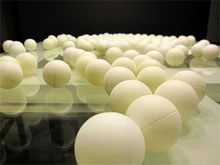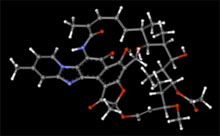|
The issue of relationship is
vital to thinking
And relationships are vital to
"simple" knowledge itself.
An isolated fact is really
useless: One of the best
demonstrations I've ever seen is when I went to Italy during
a January term when I was in high school. In a town in Sicily,
the only available guide for a bus tour didn't speak English--rather
a problem as we didn't speak Italian! The poor man dealt with
this by looking as dignified as possible, and chanting in a sing-song
voice whenever we came to a new place or work of art: "Via
Roma (or whatever), Via Roma. Very Important, Very Important."
At first this was funny but then it became terribly frustrating,
because everything was isolated and equally Important, unrelated,
and therefore ultimately useless.
Here are two other ways of
approaching the same idea
of how knowledge consists of relationships between facts:
Consider who you are today
as a human being: Your
appearance, personality, the things you care about, your strengths
and weaknesses. Did you arrive at the present moment all at once
and fully developed? Of course not! You're the product of your
family history and your responses to all of the interactions
you've had with others for your whole life. The same is true
for works of art: they're the product of their culture--seen
through the lens of the artist's personality and way of looking
at and interpreting things.
Consider how you do complex
data processing all the time--and
usually without realizing how sophisticated your thought processes
are: Think about someone you love dearly--a family member, spouse,
or boyfriend or girlfriend. Can you think of something they'd
like for their Birthday? What about something they wouldn't like--or
might even find hurtful? NOW: How did you know?
When I ask this question in class (stressing that the loved one
and the gift are private), the usual answer is "I just know."
But on further examination, folks know because they've paid attention
to their loved one, and have organized the "data" of
years of interaction with him or her--so they "just know"
the answer.
|
Knowledge is not a collection
of isolated facts. Knowledge
is facts arranged in relationship to one another. We might think
of it as a web of interrelated facts that provide a context for
one another.
Another helpful image is to think of the difference between
a collection of unrestrained ping pong balls and a "ball
and stick" model of a molecule. If the balls are facts,
the loose ping pong balls are ready to roll away and bounce.
In the model of the molecule, the balls (facts) are firmly linked
together by sticks. If you link your facts together, then if
you forget one it's no problem. You can start from any point
of the "molecule" and find your way to the fact you
forgot.
|
 |

|
Thinking involves seeing relationships
between facts or groups of facts.
And when relationships are established--when a thinker points
out relationships--then the context, and the facts themselves
become richer and deeper. And that depth, that richness of understanding
is part of the joy and fascination of what has been called "the
kingdom of the mind"
THINKING, then, requires two
things:
1. Becoming very familiar with
a body of information,
And THEN:
2. learning how to see relationships
between facts within this body of information.
This is where intellectual work
can become very creative
Images: Michael Knowles,
Ping Pong Project, 2008.
MarinaVladivostok, Ball-and-stick model of rifaximin molecule.
2013

|


